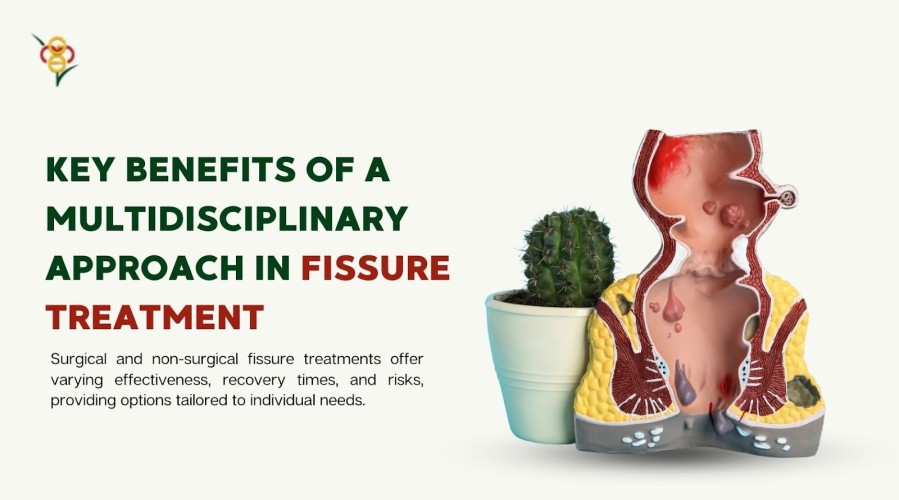Learn effective solutions for digestive problems with expert tips to improve gut health, reduce discomfort, and maintain a healthy digestive system.
multidisciplinary-approach-fissure-treatment

Why a Multidisciplinary Approach is Key to Treating Fissures
Fissures can be painful and debilitating, impacting your daily life significantly. Understanding the importance of a multidisciplinary approach to treating fissures can make a world of difference in recovery and long-term health. In this blog, we'll delve into why this approach is essential and how it can benefit you.
Understanding Fissures
What Are Fissures?
Fissures are small tears in the lining of the anus. They can cause significant discomfort, pain, and bleeding during bowel movements. While they can heal on their own, chronic fissures may require medical intervention.
Common Causes of Fissures
- Constipation: Straining during bowel movements can lead to tears.
- Diarrhea: Frequent bowel movements can irritate the anal lining.
- Childbirth: Women may develop fissures post-delivery.
- Anal Intercourse: This can cause trauma to the anal lining.
- Underlying Conditions: Diseases like Crohn’s can contribute to fissures.
Benefits of a Multidisciplinary Approach
Comprehensive Diagnosis
A multidisciplinary team comprises various specialists such as gastroenterologists, colorectal surgeons, and nutritionists. This diverse expertise ensures a thorough examination and accurate diagnosis, considering all possible factors contributing to fissures.
Personalized Treatment Plans
Every patient is unique, and so is their condition. A multidisciplinary approach allows for personalized treatment plans that address the specific needs of each patient. This tailored care improves the chances of successful treatment and recovery.
Holistic Care
Fissures can be influenced by various factors, including diet, stress, and underlying health conditions. A multidisciplinary team can address all these aspects, providing holistic care that goes beyond mere symptom management.
Coordinated Care
With multiple specialists working together, there is better coordination in treatment plans. This ensures that all aspects of the patient’s health are considered, leading to more effective and efficient care.
Access to Advanced Treatments
Multidisciplinary teams often have access to the latest medical advancements and technologies. This can include minimally invasive surgeries, advanced diagnostic tools, and innovative therapies that might not be available through a single-specialist approach.
Key Components of Multidisciplinary Care
Gastroenterologist’s Role
Gastroenterologists play a crucial role in diagnosing and managing fissures. They can perform endoscopic procedures to assess the severity and suggest appropriate medical treatments.
Role of Colorectal Surgeons
For chronic or severe fissures, colorectal surgeons can perform necessary surgical interventions. They bring expertise in minimally invasive techniques that promote faster healing and reduce recovery time.
Importance of Nutritionists
Diet plays a vital role in both the prevention and management of fissures. Nutritionists can develop dietary plans that prevent constipation and promote digestive health, which is critical in fissure treatment.
Psychological Support
Chronic pain and discomfort can take a toll on mental health. Psychologists or counselors can provide support, helping patients manage stress and anxiety, which can contribute to better overall health outcomes.
Steps in a Multidisciplinary Treatment Plan
- Initial Consultation: Meeting with the multidisciplinary team for a comprehensive evaluation.
- Diagnostic Tests: Undergoing necessary tests such as endoscopy, colonoscopy, or imaging studies.
- Personalized Treatment Plan: Developing a tailored plan that includes medical, surgical, dietary, and psychological interventions.
- Regular Follow-ups: Continuous monitoring and adjustments to the treatment plan as needed.
- Support and Education: Providing patients with information and support to manage their condition effectively.
When to Seek a Multidisciplinary Approach
If you are experiencing persistent anal pain, bleeding, or discomfort, it's essential to seek professional help. A multidisciplinary approach is particularly beneficial if:
- Your fissures are not responding to standard treatments.
- You have underlying health conditions that may complicate treatment.
- You require comprehensive care that addresses more than just the symptoms.
Schedule an Appointment with GEM Hospital
At GEM Hospital, we specialize in a multidisciplinary approach to treat fissures. Our team of experts is dedicated to providing comprehensive, personalized care to help you achieve the best possible outcomes. Don't let fissures disrupt your life—schedule an appointment with us today to start your journey toward recovery.
Blogs & Article
Explore current research trends in digestive health, including new treatments, advanced diagnostics, and innovations improving gut health and patient care.
Discover common digestive health myths and the real facts. Learn simple tips to improve gut health and maintain better digestion for a healthier life.


